Survey confirms that vaccination rollouts are influencing student choice
- QS’s massive global survey of prospective international students shows that significant numbers want to study abroad sooner than later due to the introduction of vaccines
- Most students are willing to be vaccinated and more than 4 in 10 would receive a vaccine in their home country before travelling if this were required by an institution
- Nearly half (45%) do not think the UK government handled its COVID crisis effectively – but the government’s speedy vaccine rollout is giving the UK a competitive edge among destinations
New QS global research indicates that the introduction of COVID vaccines is strengthening prospective international students’ resolve to study abroad, and that many students now want to begin their studies sooner than they had planned because of vaccine availability. The research also shows that:
- An overwhelming majority (71%) would rather quarantine in a host country to be able to study in-person than remain at home and have to study online (29%);
- More than two-thirds (68%) would accept the coronavirus vaccine if it were offered to them, and 43% would receive it in their home country before travelling if this were required.
QS also explored the relative popularity of leading study abroad destinations and found that the UK’s image has become much stronger in 2021. Nearly half (47%) of surveyed students who were considering studying in the UK have become more interested as a direct result of the UK’s vaccination rollout.
QS partnered with 115 institutions worldwide to gather responses from more than 105,000 prospective students in 191 countries for its 2021 International Student Survey. They then combined results with their ongoing Coronavirus Student Survey (CSS). Of the total sample, 48,722 were interested in studying in the UK. Three-quarters (74%) of surveyed students were aged 17–24 and 26% were 25 or older. The majority of students were looking at the postgraduate programmes (61%), while 37% were interested in undergraduate studies.
Of the survey, Higher Education Policy Institute Director Nick Hillman says,
“The results of this year’s QS International Student Survey are compelling. The Survey is large, covers people from pretty much the whole world and includes qualitative information alongside the hard numbers. It is also more revealing than ever, given the enormous changes that have beset staff, students and institutions in recent months.”
The results of the research are summarised in a report entitled Supporting recovery and driving growth in global higher education: UK International Student Survey 2021.
Vaccination rates are influencing students’ decision-making
More than half (56%) of surveyed students told QS that different governments’ handling of the coronavirus crisis had made them reconsider where they will choose to study. And as we predicted in February, their decisions about where to study are being influenced by COVID vaccination rates in various destinations.
Vaccine rollouts appear likely to significantly affect universities’ enrolments in 2021. QS’s Coronavirus Student Survey (CSS) found that 1 in 5 prospective students (19%) want to begin their studies earlier than planned as a result of the introduction of the vaccine.
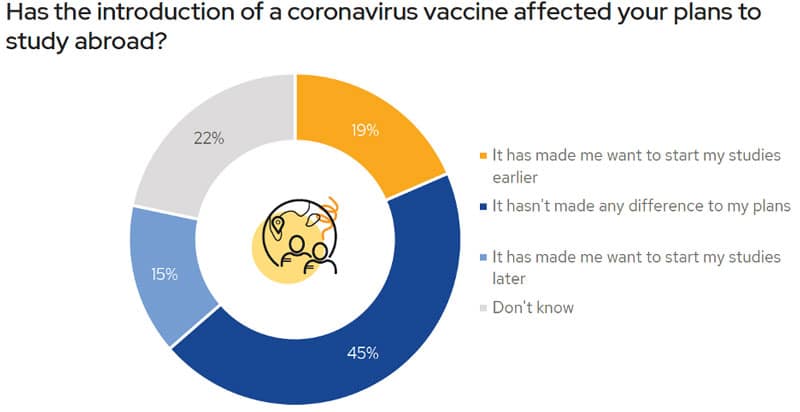
The UK’s vaccine rollout appears to be deepening the interest of students who are already considering studying there. The QS research found that 17% of those students think the UK has done a better job than other countries – including top competitors the US, Canada, and Australia – at distributing the vaccine. This is interesting because it counterbalances an overall perception that the UK government handled their coronavirus crisis much less effectively than Canada or Australia.
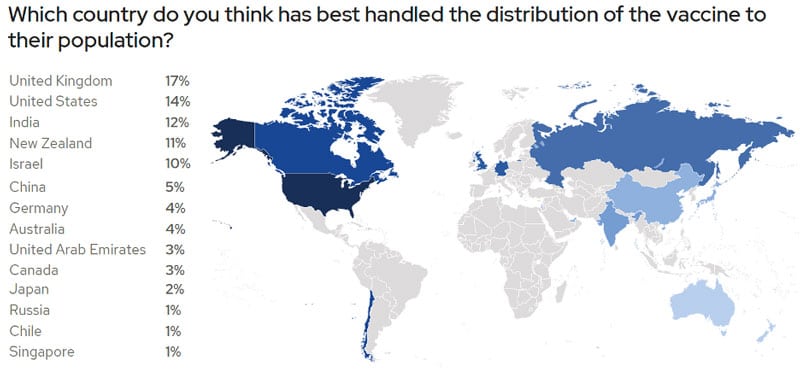
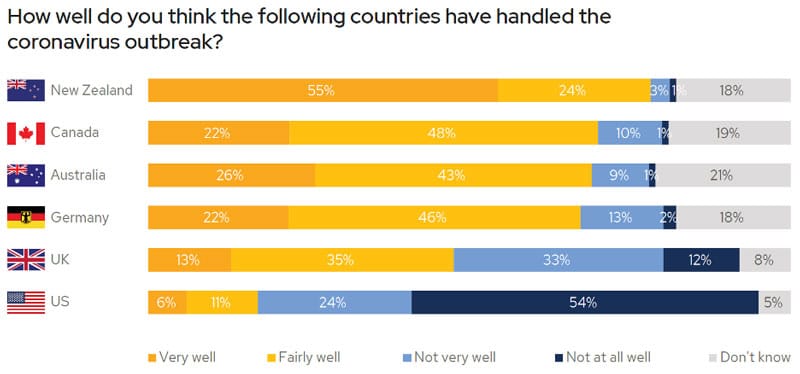
QS notes that UK universities should leverage their country’s vaccination success in their marketing communications:
“It is vital that universities are able to leverage the benefits of this when communicating with their prospective international students as the success of vaccination programmes domestically is likely to have a direct correlation with the ability to open the country’s borders to international students.”
But QS also notes:
“For international students, the success of the vaccination programme can only be realised once it allows a lifting of social restrictions so that university campuses can open for face-to-face teaching, only then will they be able to truly appreciate its benefits.”
UK is perceived as having become more welcoming to non-EU students
More than half of surveyed students (58%) believe that UK is becoming more welcoming, slightly more than those who feel this way about Canada (56%). This is important given that students care more about a country’s being welcoming to them (52%) than any other motivator other than high-quality teaching (60%). The UK is faring much better than the US on this component of its image.
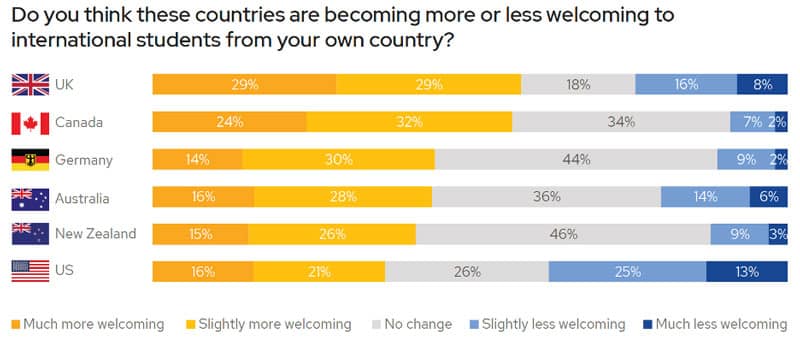
A major caveat here, however, is that the UK’s “welcoming” average is driven by non-EU students; in Europe, there is far more sentiment that the UK has become less welcoming, almost certainly because of Brexit.
The following charts show the markets where the UK is perceived most positively in this regard. QS notes that the post-study work rights available to international students in the UK beginning this summer is likely a major reason for the positive reaction seen in non-EU markets. Within the span of a year, the percentage of students who want to remain in the UK after graduating has risen from 48% to 56%.
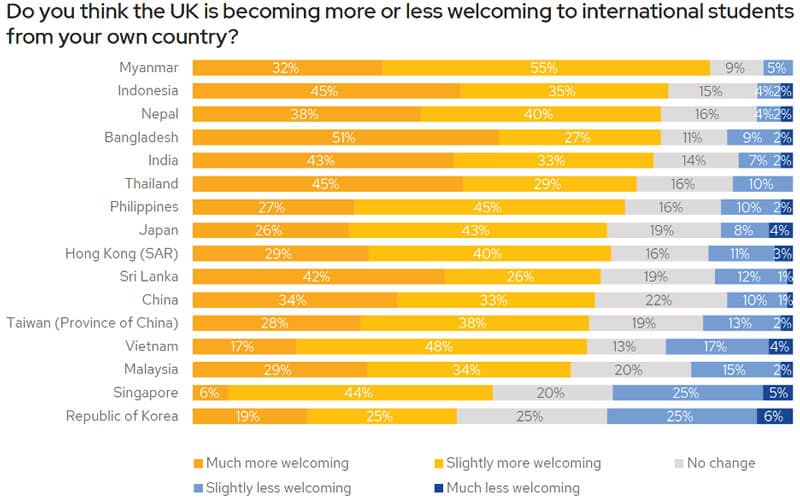
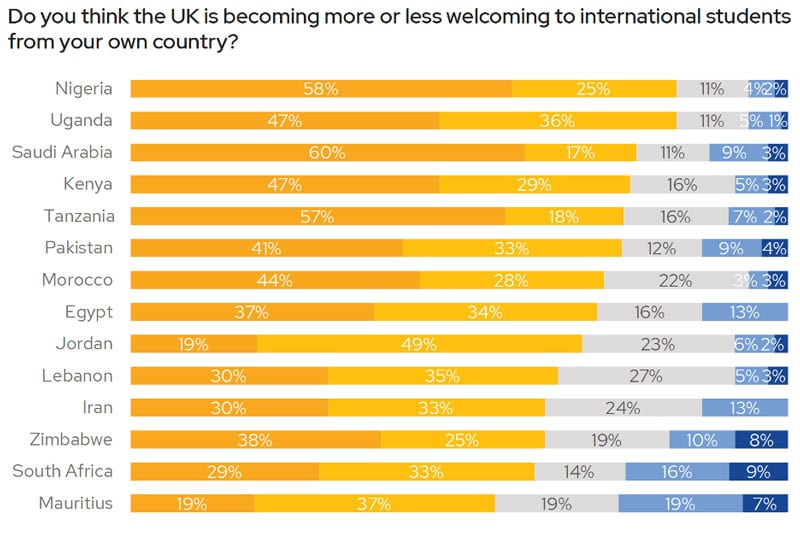
What it all means for recruiting in 2021
QS notes that international students’ changing perceptions of destination countries’ response to COVID will be a major factor in enrolment trends in 2021:
“As we reach a pivotal moment in the international recruitment cycle for 2021, the survey seeks to understand the views of prospective students with regards to the pandemic and what this could mean for universities in September. With many universities unable to recruit as many international students in 2020 as they would like, the coming months will be crucial for them to ensure that 2021 does not involve similar disappointment.”
For additional background, please see:
















